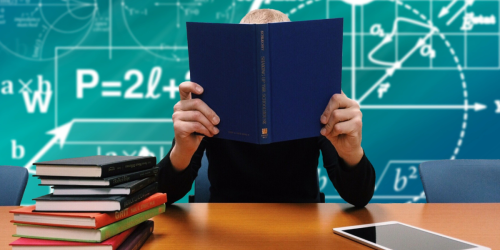
Five books every aspiring or current Theology, Religion, and Philosophy of Religion student should read
Dr Ruth Ravenscroft provides an inspiring reading list to familiarise yourself with this exciting interdisciplinary subject.
Dr Jonathan Padley’s suggested readings will help you navigate this flexible interdisciplinary programme.
Education is a flexible interdisciplinary programme which allows you to explore what it means to be educated in childhood and beyond; how learning relates to different social, political and economic contexts, to the arts and the development of the human mind.
The career options for an Education graduate are extremely varied and they find employment in a wide range of occupations and fields in the UK and abroad.
Dr Jonathan Padley, Lucy Cavendish College’s Director of Studies in Education has compiled a list of six books to help you explore this fascinating field:
 1. Introduction to Education Studies by Steve Bartlett and Diana Burton
1. Introduction to Education Studies by Steve Bartlett and Diana Burton
Introduction to Education Studies has proven itself to be the key text for students of Education Studies for over a decade, leading readers through the field′s key ideas, concepts and debates. Drawing from the main educational themes of sociology, philosophy, history, psychology and policy, Bartlett and Burton introduce you to different ways of looking at education and the ideologies that shape educational systems. Tightly supported by accessible links to research literature and keenly aware of contemporary developments, this book encourages you to adopt a critical, questioning approach to your study in order to develop an engaged and informed understanding of education.
 2. An Introduction to the Study of Education (4th ed.). By David Matheson
2. An Introduction to the Study of Education (4th ed.). By David Matheson
This fully updated, fourth edition of An Introduction to the Study of Education provides a comprehensive and reflective introduction to the study of education, inviting students to question what education is, who it is for and what purpose it serves. Taking the reader from the early years through to lifelong learning, it examines all forms of education and learning. This new edition includes ten completely new chapters and a step-by-step guide to essay writing.
 3. Education and International Development: An Introduction by Tristan McCowan and Elaine Unterhalter
3. Education and International Development: An Introduction by Tristan McCowan and Elaine Unterhalter
Education and International Development provides a comprehensive introduction to the field, giving an overview of the history, influential theories, important concepts and areas of achievement, and presenting a critical reflection on emerging trends in policy, practice and research.
With chapters that review key challenges and inspiring initiatives in countries around the globe - focusing on critical issues such as language, conflict and teachers - this book serves both as a companion to graduate studies in international education and a concise reference book for practitioners and educators in the field.
 4. English Literature in Context by Paul Poplawski
4. English Literature in Context by Paul Poplawski
Supporting the study of English literature from the Middle Ages to the present, this book is designed as an introductory text AND a helpful reference tool for an entire English Literature degree. Its key mission is to help students understand the link between the historical context in which the literature developed, how this has influenced the literature of the period and how subsequent periods in literature have been influenced by those that precede them. The book is carefully structured for undergraduate use, with a rich range of illustrations and text boxes that enhance and summarise vital background material. The seven chronological chapters are written by a team of expert contributors who are also highly experienced teachers with a clear sense of the requirements of the undergraduate English curriculum. Each chapter includes a detailed chronology, providing a quick-reference guide to the period; contextual readings of select literary texts; and annotated suggestions for further reading.
 5. Psychology and the Study of Education: Critical Perspectives on Developing Theories by Cathal O Siochrú
5. Psychology and the Study of Education: Critical Perspectives on Developing Theories by Cathal O Siochrú
Psychology and the Study of Education: Critical Perspectives on Developing Theories explores both the insights and applications that psychology can offer in a range of educational contexts. Introducing the reader to a wide variety of sources, from cutting-edge research to key studies from the past, it offers new perspectives on the psychology of education. This includes re-examining core theories of learning, unpicking key learning processes and reconsidering the role of factors such as memory, creativity and gender in learning. Questioning myths and misconceptions, it challenges the reader to develop a critically reflective approach and asks them to reconsider the potential value of psychology in both understanding and influencing education.
 6. A Student’s Guide to Education Studies by Stephen Ward
6. A Student’s Guide to Education Studies by Stephen Ward
A Student’s Guide to Education Studies is a much-needed resource for any undergraduate making their first explorations into the fascinating world of education. The first publication of this book in 2002 helped to define the nature of the subject, introducing topics into the field which had not been previously considered. This new edition brings the subject up to date with the latest thinking and research on policy, globalisation, learning and knowledge, offering an accessible and wide-ranging introduction to a diverse range of topics and issues in education.
Explore your subject further
Supracurricular exploration is an important way to expand your knowledge of your subject, explore your interests and develop your skills. Our new webpage contains guidance on supracurricular exploration and a comprehensive source of resources, grouped according to undergraduate degrees at Cambridge.

Dr Ruth Ravenscroft provides an inspiring reading list to familiarise yourself with this exciting interdisciplinary subject.

Lucy’s Director of Studies in Mathematics, Dr Julian Gilbey, provides an inspiring top four list.